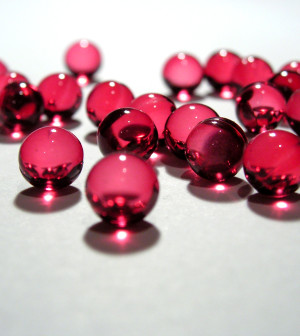- The Best Time of Day to Drink Bone Broth to Maximize Health Benefits
- 8 Ways to Increase Dopamine Naturally
- 7 Best Breads for Maintaining Stable Blood Sugar
- Gelatin vs. Collagen: Which is Best for Skin, Nails, and Joints?
- The Long-Term Effects of Daily Turmeric Supplements on Liver Health
- Could Your Grocery Store Meat Be Causing Recurring UTIs?
- Are You Making This Expensive Thermostat Error This Winter?
- Recognizing the Signs of Hypothyroidism
- 10 Strategies to Overcome Insomnia
- Could Artificial Sweeteners Be Aging the Brain Faster?
Diet Tied to Better Breathing in COPD Patients


People with certain chronic lung diseases might breathe a bit easier when their diets contain healthy foods like fruits and fish, a new study suggests.
Researchers found that among nearly 2,200 adults with chronic obstructive pulmonary disease (COPD), those who ate fish, grapefruit, bananas and cheese tended to have better lung function and fewer symptoms than their counterparts who did not eat those foods.
COPD is an umbrella term for the progressive lung diseases emphysema and chronic bronchitis. In the United States, about 15 million people have COPD, and the disease is the third leading cause of death nationwide, according to the U.S. Centers for Disease Control and Prevention. Smoking is the leading cause of COPD.
It’s not clear yet whether diet has direct effects on COPD patients’ lungs. The new study, reported at the American Thoracic Society’s annual meeting in San Diego, only shows an association between certain foods and better lung function.
That doesn’t prove cause-and-effect, said lead researcher Corrine Hanson, who was scheduled to present the results on Wednesday.
And no one is saying bananas are the magic bullet against COPD, stressed Hanson, an assistant professor at the University of Nebraska Medical Center in Omaha.
But COPD patients who eat fruit, fish and dairy products might have a healthy, well-rounded diet, Hanson said. And it’s “plausible,” she said, that foods that have antioxidant and anti-inflammatory effects could benefit COPD patients’ lungs.
“It’s probably the overall dietary pattern that matters,” Hanson said.
That, in fact, is what some past research suggests, said Dr. Carlos Camargo, a professor at Harvard Medical School who was not involved in the new study.
In his own research, Camargo has found that people with diets high in fruits, vegetables, fiber-rich grains and fish are less likely to develop COPD compared to people who eat a lot of processed foods, red meat and sweets.
“We think that diet as a whole is important,” Camargo said. He added, though, that to really prove that a healthy diet improves lung function, you’d have to do a clinical trial — where people with COPD would be randomly assigned to follow a particular eating plan or not.
“A trial like that is hard to do,” Camargo noted. “But it can be done.”
As an example, he cited the recent PREDIMED trial, which showed that the classic Mediterranean diet can cut the odds of heart attack and stroke in high-risk older adults.
“We should do something similar with COPD,” Camargo said.
For the current study, Hanson’s team used data from a larger project that followed COPD patients over three years. At eight different time points, the participants were asked whether they had eaten grapefruit, bananas, fish or cheese over the past 24 hours.
In general, people who had eaten any of those foods showed better lung function on standard tests, had a quicker walking pace, and tended to have lower levels of certain inflammatory indicators in the blood.
In some cases, the relationship was immediate, meaning people who ate a certain food did better on certain tests the next day. In other cases, the link was longer-term, meaning certain foods were tied to better lung function over time.
Hanson said it’s possible that some foods, such as fruits and vegetables, have a short-term anti-inflammatory effect. But it’s more likely that the individual foods in this study are signs of a higher-quality diet.
There’s no good reason to suspect that eating a lot of cheese, for example, would boost lung function. But, Hanson said, cheese might be an indicator of people’s intake of vitamin D, which, some evidence suggests, might help COPD patients breathe a bit easier.
“I think the take-away is that diet may be a modifiable factor for COPD patients,” Hanson said. “When we think about diet and disease, we usually think about heart disease and diabetes. But people with lung disease should be thinking about diet, too.”
Camargo agreed. “The lesson that’s emerging is that foods like fruits, vegetables and fish may be beneficial for lung health,” he said.
And if you’re looking for a generally healthful way of eating, Camargo and Hanson pointed to the Mediterranean diet. It’s rich in fruits and vegetables, whole grains, fish, beans and unsaturated “good” fats from sources such as olive oil and nuts. It’s also low in processed foods, high-fat dairy and red meat.
Data and conclusions presented at meetings are typically considered preliminary until published in a peer-reviewed medical journal.
More information
The U.S. National Heart, Lung and Blood Institute has more on COPD.
Source: HealthDay
Copyright © 2026 HealthDay. All rights reserved.










